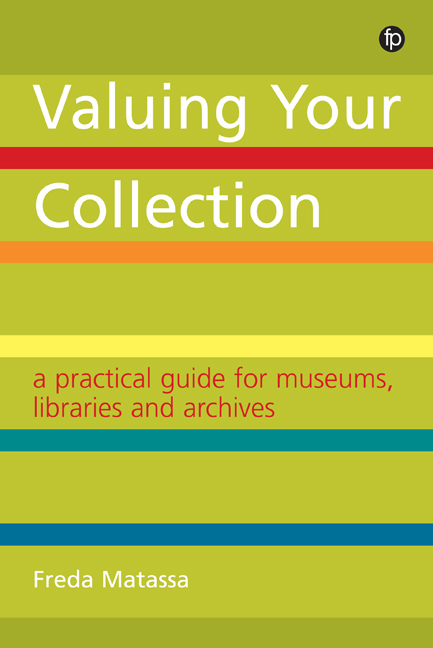Book contents
- Frontmatter
- Dedication
- Contents
- List of figures and tables
- Preface
- Acknowledgements
- 1 Introduction
- 2 The difficulty of valuation
- 3 Law and ethics
- 4 Insurance
- 5 Alternatives to insurance
- 6 Valuing your collection
- 7 Valuing an entire collection
- 8 Assigning a value
- Case studies: valuing different types of objects
- Templates
- Appendix 1 UK Government valuation of cultural items
- Appendix 2 European Report, Valuation of Works of Art for Lending and Borrowing Purposes
- Appendix 3 Glossary
- Bibliography
- Index
Appendix 1 - UK Government valuation of cultural items
Published online by Cambridge University Press: 08 June 2018
- Frontmatter
- Dedication
- Contents
- List of figures and tables
- Preface
- Acknowledgements
- 1 Introduction
- 2 The difficulty of valuation
- 3 Law and ethics
- 4 Insurance
- 5 Alternatives to insurance
- 6 Valuing your collection
- 7 Valuing an entire collection
- 8 Assigning a value
- Case studies: valuing different types of objects
- Templates
- Appendix 1 UK Government valuation of cultural items
- Appendix 2 European Report, Valuation of Works of Art for Lending and Borrowing Purposes
- Appendix 3 Glossary
- Bibliography
- Index
Summary
The UK Government is involved in valuation in a number of areas, under the responsibility of the Department for Culture, Media and Sport (DCMS), www.gov.uk/dcms. The DCMS holds responsibility for Subrogation, Spoliation and the Export Reviewing Committee, in all of which valuations may form an essential part of the process. Full details can be found on www.culture.gov.uk.
Arts Council England (ACE), www.artscouncil.org.uk, holds responsibility for certain statutory requirements and a range of responsibilities that support the cultural sector. Its purpose is to preserve, advise and be an advocate for collections and access to collections. Responsibilities include administering Government Indemnity, Acceptance in Lieu, Cultural Gifts Scheme, Export Controls for Valuations, Accreditation and Designation.
Acceptance in Lieu (AIL)
Items of cultural worth to the nation may be accepted in lieu of inheritance tax. The purpose of the scheme is to bring pre-eminent items into the public domain and to prevent, if possible, the item leaving the UK if it is likely to be sold abroad.
When an item is offered to the state, a panel, which may include dealers, former curators, museum staff and other experts, is formed to advise on the object and its financial value. The owner must give a value for the item and provide a rationale. The panel carefully considers this value and may agree or disagree with it. If they differ in their opinions, outside experts will be consulted. The value finally chosen is what the item would be expected to fetch at auction at the time of the donation.
The panel members look at comparable objects and recent sales. In many cases, part of the estate has already been sold with the remainder offered for AIL; in such a case the recent sales price is a helpful guide to value. If the items are particularly rare and therefore difficult to value, up to five experts may be called on for their opinion.
AIL has usually been concerned with items of fine art but in 2010 the first non-art item, a natural history object, was accepted and required very specialist advice.
- Type
- Chapter
- Information
- Valuing Your CollectionA practical guide for museums, libraries and archives, pp. 201 - 206Publisher: FacetPrint publication year: 2017



